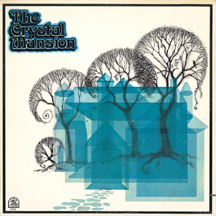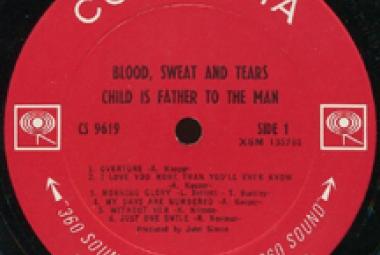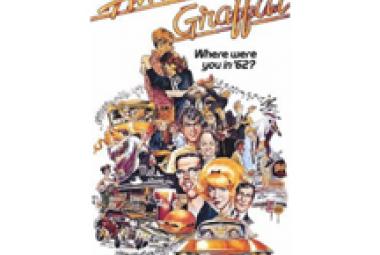THE CRYSTAL MANSION (1971 Album)
In his Allmusic review of Crystal Mansion’s 1971 album, The Crystal Mansion (though granting that album only two stars), Joe Viglione calls their 1968 single “The Thought of Loving You” “a little mini-pop masterpiece” and “a timeless pop song”. This song, “The Thought of Loving You” was released by Cher in 1968 (as a single only) and was later recorded by the Jimmy Castor Bunch, the Manhattan Transfer, Spiral Starecase, Lou Christie, Astrud Gilberto, and Wayne Newton. Unfortunately, the earlier Capitol album Crystal Mansion (1969) sold poorly – Allmusic describes it as “an album that turned out a disappointment for all involved” – and information on the Internet about this album is hard to come by.
* * *
After being dropped by Capitol Records, Crystal Mansion finally added a bass guitarist, Billy Crawford and released a single in 1970 for Colossus Records, the same label that released records in America by the Dutch band Shocking Blue, including their mega-hit “Venus”, also in 1970. The 45 was released under the name Crystal Mansion Featuring Johnny Caswell, with the “A” side being the James Taylor song “Carolina in My Mind” and an original song (by Johnny Caswell and Sal Rota) called “If I Live” on the flip. When Collectables Records reissued the 1971 album The Crystal Mansion on CD in 1994, “Carolina in My Mind” was included as a bonus track.
* * *
The next year, Crystal Mansion became one of the bands added to the roster of the Motown Records subsidiary Rare Earth Records that featured white acts. This album, The Crystal Mansion has virtually the same name as their 1969 album Crystal Mansion and is the one that I have. Bandmembers for this 1971 release are – in the order given on the back cover – Rick Morley (percussion), Sal Rota (organ, piano, vocal), Ronnie Gentile (guitar), Mario Sanchez (conga, vocal), Bill Crawford (bass), and Johnny Caswell (vocal, piano). Under his real name, former bandmember David White Tricker appears courtesy of Bell Records and co-wrote three of the songs.
Tepid opinions of this album are fairly commonplace on the Internet; besides the two-star review by Allmusic already mentioned, Badcat Records also grants the record only two stars. Crystal Mansion is compared unfavorably to the namesake of the Motown label, Rare Earth; while Johnny Caswell certainly lacks the propulsive pipes of their drummer and lead singer Peter Rivera, Caswell and Crystal Mansion are after a completely different groove on their album.
My own theory is that Crystal Mansion suffers from the same “problem” as last month’s UARB, the Human Zoo: The band has real variety in its material and doesn’t sound the same all through the record. The Allmusic article on the band, by Lars Lovén, starts off: “The Crystal Mansion’s relatively short story is that of a white R&B band moving towards groovy psychedelic rock in the ’70s.” Joe Viglione writing for Allmusic grudgingly acknowledges this about the final track: “‘Earth People’ is reminiscent of ‘Calling Occupants’, the hit for the Carpenters and Klaatu. It is the highlight of the album. Let’s call it Crystal Mansion’s ‘I’m Your Captain / Closer to Home’.” The reference of course is to the closing song on the Grand Funk Railroad breakthrough album, Closer to Home (1970), “I’m Your Captain”, although Crystal Mansion was able to craft their memorable song in barely one third the playing time of the Grand Funk track.
Billboard magazine has an appreciative review of the album in their May 27, 1972 issue: “A fluid rhythmic feel permeates the texture of the Crystal Mansion album. Johnny Caswell has a strong, although not overpowering, voice that he uses to good effect. Their arrangements are uncomplicated and clean, their sound chiefly blue-eyed soul. Standout cuts include ‘Boogieman’, ‘Satisfied’ and ‘Earth People’.”
The Crystal Mansion has R&B, funk, country, psych, progressive, and pop influences sprinkled among its 10 tracks. The stronger material is on the album’s second side, with “Earth People” preceded by a foreboding trio of introspective tracks, “Someone Oughta Turn Your Head Around”, “Boogieman” and “Let Me Get Straight Again” (with the first and last being penned by the band as a whole), followed by the calming “Peace for a Change”. But Side 1 also has several good cuts, such as the opening song “There Always Will be More” and the catchy “Satisfied”.
(August 2015)















